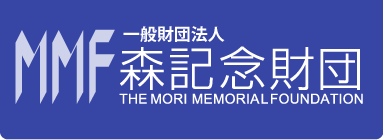Global Power City Index - 2008
The first Japan-based comprehensive ranking
survey of the major world cities
Abstract
Under the severe international competition among cities, the Global Power City Index evaluates and ranks the "comprehensive power" of the major cities in the world with a very unique method developed by Institute for Urban Strategies at The Mori Memorial Foundation. There is an assumption that the integration of variety of powers that attract creative people and companies from all over the world is the "comprehensive power of a city."
Global Power City Index is the first ranking survey for international cities undertaken in Japan. 30 major cities in the world are selected and evaluated based on 63 indicators of city function in six main functions representing city strength such as "Economy," "Research & Development," "Cultural Interaction," "Livability," and "Space & Access." Furthermore, evaluation is carried out from the view points of four global actors who are leading the urban activities in their cities such as "Managers," "Researchers," "Artists," and "Visitors" and one local actor, "Residents." A matrix composing city actors and city function indicators is created and the evaluation is carried out in multiple methods. This research is very unique in the world that evaluates cities from both subjective and objective methods, based on city functions and city actors.
This research is carried out with the involvement of academics such as Sir Perter Hall, a global authority in city planning, as well as Dr. Richard Bender, Dr. Saskia Sassen, and other renowned international scholars. Peer review by third parties are carried out as well to maintain the fairness of the ranking.
GPCI-2008 Comprehensive Ranking Top5

New York
London
Paris
Tokyo
Vienna
ORGANIZATION
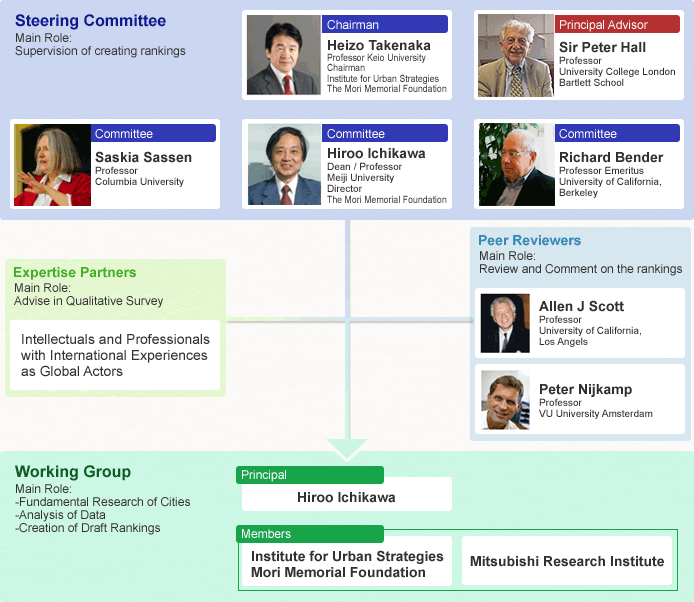
FINDINGS (GPCI-2008)
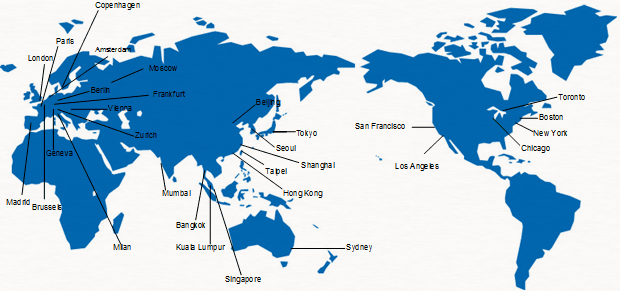
Function-based Comprehensive Ranking
Function-based Total Ranking (GPCI-2008)
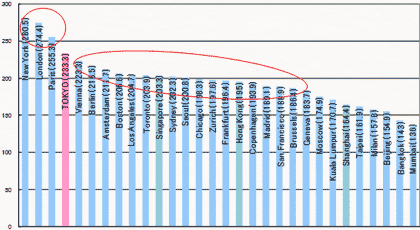
The top three of the function-specific comprehensive ranking are New York, London and Paris. Tokyo is ranked fourth; however, the gap between fourth and third is comparatively wide and it can be said that Tokyo is running top in the second group of cities under the severe competition.
Function-based Ranking
Function-based Ranking (GPCI-2008)
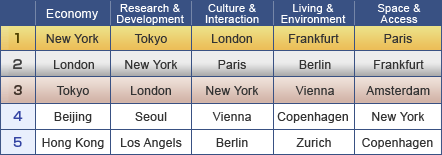
There are some cities which stay low in the total ranking but are ranked high in specific functions, such as Frankfurt, Amsterdam and Berlin in the "Living and Environment" and "Space and Accessibility" functions.
In Asia there are a number of cities ranked high in the "Economy" function, while in Europe there are many cities ranked high in the "Culture and Interaction," "Living and Environment," and "Space and Accessibility" functions.
Actor-based Ranking
Actor-based Ranking (GPCI-2008)
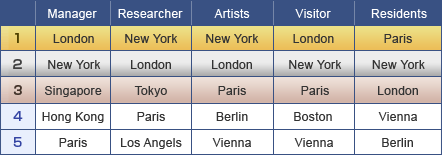
When examined from the standpoint of any of the four global actors, who are leading the urban activities in their cities, and their residents, New York, London, and Paris are highly attractive cities. These three cities are special in obtaining overall city appeal, putting their scores far higher than any other city.
Of the 30 cities surveyed, over half of all Asian cities are ranked 21st or lower with respect to each actor segment, except for "Managers." In particular, a large number of Asian cities received remarkably low evaluations from the “Residents” perspective.
Relationship between Function-based Ranking and Actor-based Ranking
Cities with high score in "Economy" indicators, such as GDP and accumulation of enterprises, are not always viewed as attractive cities from the standpoint of "Managers."
Comparison of Tokyo with the Top Three Cities (New York, London, Paris)
Tokyo is drastically inferior in the "Culture and Interaction" and "Space and Accessibility" functions in the function-based evaluations. As for actor-based evaluations, Tokyo is on a par with top 3 cities from the standpoints of "Researchers," "Artists," and "Residents." However, Tokyo scores significantly low from the standpoint of "Managers" and "Visitors."
Comparison of Tokyo with the Major Economic Cities of Asia
Tokyo is extremely strong in "Research & Development" function among major economic cities in Asia. However, it has no particular advantage over other Asian cities in the "Living and Environment" and "Space and Accessibility" functions.
Actor-based evaluations also showed that Tokyo is highly ranked from the "Researchers" perspective but ranked relatively low even within Asian cities from the standpoint of "Managers" and "Visitors."
Comparison of Tokyo with the Five Major Cities in the BRICs Countries
When compared with the cities of the rapidly developing (B)RICs countries, Tokyo has a demonstrable advantage in the functions of "Economy," "Research & Development," and "Living and Environment." However, in the "Economy" function, Hong Kong and Shanghai have similar scores, meaning Tokyo’s advantage is not always secured for the future. Furthermore, Hong Kong outranks Tokyo in "Managers" and "Visitors" in actor-based rankings.
Challenges for Tokyo compared with the World’s Major Cities
In order for Tokyo to raise its level of attractiveness for "Managers," it needs to improve its business environment by relaxing regulations and taxes, reducing the danger posed by natural disasters, and by promoting other measures which will increase the ease of doing business. In order for Tokyo to raise its level of attractiveness for "Visitors," it needs to improve its tourism environment, such as by increasing the number of foreigner-friendly hotels and by developing, maintaining and improving appealing tourism resources.
Methodology - Function-based Ranking (GPCI-2008)
Elements to evaluate each function of city are listed up on the right and 63 Indicators to mathematically evaluate each element are formulated to the left
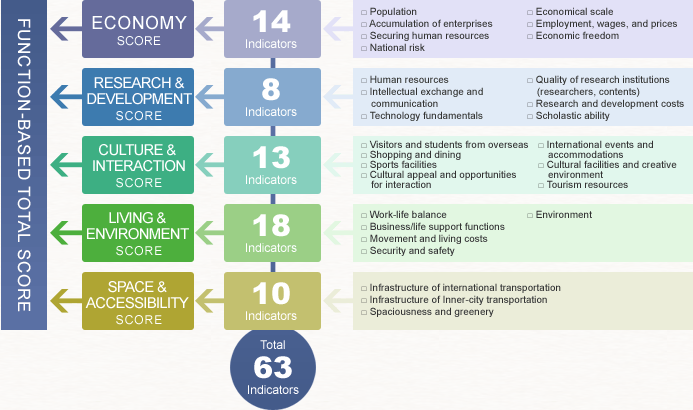
63 Indicators are referenced and customized from the statistical data issued from worldwide authorities, created based on the questionnaire survey conducted by The Mori Memorial Foundation, or produced by the own research by The Mori Memorial Foundation.
Sum of each score gained from each indicator are assembled in each function and finally become the total score of the city.
Methodology - Actor-based Ranking (GPCI-2008)
 MANAGERS
Businessman
|
 RESEARCHERS
Researcher
|
 ARTISTS
Artist
|
 VISITORS
Tourist
|
 RESIDENTS
Resident
|
MANAGERS
|
RESEARCHERS
|
ARTISTS
|
VISITOR
|
RESIDENTS
|
Profiles of each Actor are assumed and agendas in evaluating cities
from the standing point of those Actors are considered.
MANAGERS
|
RESEARCHERS
|
ARTISTS
|
VISITORS
|
RESIDENTS
|
Key elements for each Actor are extracted from the agendas and listed below.
Specific indicators to evaluate each Actor’ s score are selected from
the 63 indicators in the matrix with 33 Key elements and summed up as Actor-based score.
 |
 |
 |
 |
 |
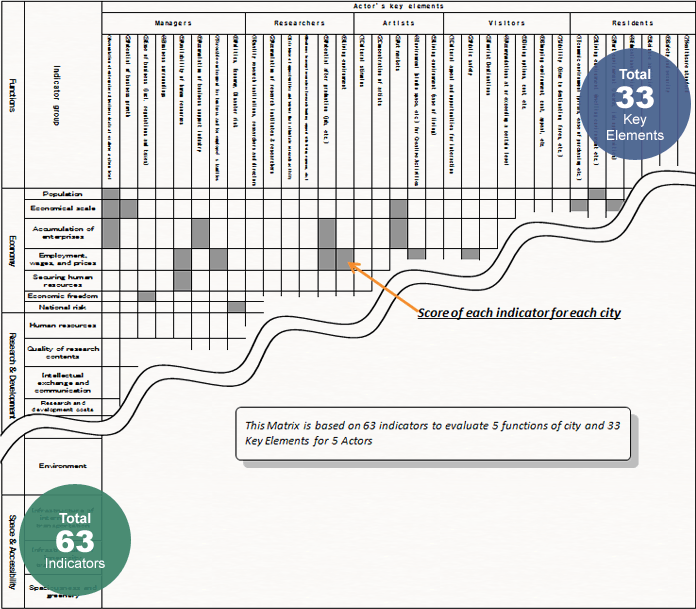
The research for GPCI-2009
Under the evolution of the social structure following the spread of world wide economic crisis and other agendas such as energy or environmental issues, roles for global cities seem to become more critical in the world. In this trend of the world, "GPCI-2009" has been initiated to pursue the situation of global cities and find out the expectations for each city including Tokyo. For GPCI-2009, targeted cities has been increased from 30 to 35 cities and new indicators has been applied as well as improving methodologies in evaluating cities.
Furthermore, to deepen the analysis in the structure of the global cities, the concept of "Global Circuit," introduced by Prof. Saskia Sassen, has been involved in the research. Also, leading cities in the world and in Asia are focused and analyzed in those indicators for each function of the city deeper to reveal their potentials of the power.
